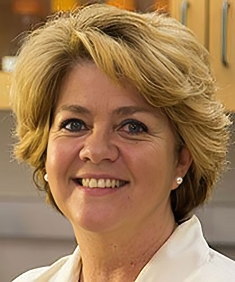Professor Maria Gloria Dominguez Bello Gives Keynote Speech at Rutgers' 2018 Microbiology Symposium

By Emily Hanselman
There is an emerging body of literature on the associations between urbanization, microbiome and human diseases. What are the changes that have occurred in our microbiome as our society has become more urban? How does urbanization affect the microbiome of infants, their development and long-term health? Using evidence from evolution, anthropology and microbiology, Dr. Maria Gloria Dominguez-Bello addressed these questions in her keynote lecture at the 2018 Rutgers Microbiology Symposium on February 1st.
Dr. Dominguez-Bello discussed evidence that the diversity of human microbiota is reduced by urban life, which starts at birth. She unearthed the central roles that birth and the environment play in establishing the microbiota composition of an infant, including delivery method, breastfeeding, skin-to-skin contact and, in older infants, exposure to microbes from the environment. Urbanization is accompanied by increased medical intervention at birth, more frequent antibiotic use, decreased breastfeeding and less skin-to-skin contact, as well as more sanitized indoor environments, which collectively reduce an infant's normal exposure to microbes.
Comparing maternal microbiota from various maternal body compartments to infant gut microbiota, Dr. Dominguez-Bello found that infants born via caesarean section had microbiota similar to that of maternal skin and had decreased diversity, while the microbiota of those born vaginally were similar to maternal vaginal microbiota with a higher level of diversity. Furthermore, mice delivered by C-section had increased weight gain and total body mass after weaning. In humans, C-section has been associated with increased risk of modern diseases, including asthma, type 1 diabetes, celiac disease and obesity. To ameliorate these effects, the Dominguez-Bello laboratory has developed and tested interventions to restore a normal microbiota in infants after C-sections.
In addition to clinical interventions, Dr. Dominguez-Bello discussed the importance of an international initiative to preserve microbes from traditional peoples as our world rapidly urbanizes. A global microbiota vault located in a cold climate could preserve rare strains of bacteria for future research and clinical application.